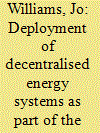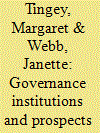| Srl | Item |
| 1 |
ID:
101452


|
|
|
|
|
| Publication |
2010.
|
| Summary/Abstract |
The housing growth programme could offer an opportunity for accelerating the deployment of decentralised renewable energy systems (DRES) in the UK. The Government hopes to leverage private sector investment into DRES as part of new housing projects. The aim of this paper is to assess whether current regulatory and funding frameworks are sufficient to achieve this. The question is explored by drawing on the experience of developers, local authorities, energy utilities and service companies operating in the largest housing growth region in the UK-Thames Gateway. Their experience suggests that the current low intervention approach will be insufficient to generate the shift required in both industries. In order to be more successful economic and regulatory instruments should focus on producers (house-builders and energy providers) rather than consumers (households). Tighter regulation is needed to ensure that producers have a responsibility to install DRES as part of new developments, to enable connection to the grid, to ensure a sustained financial return from investment and revenue is spent on the expansion of new renewable energy infrastructure. This regulatory framework must be under-pinned by substantial funds focused on producers. Greater intervention is needed if DRES is to be included in new housing development.
|
|
|
|
|
|
|
|
|
|
|
|
|
|
|
|
| 2 |
ID:
171526


|
|
|
|
|
| Summary/Abstract |
UK Local Authorities are increasingly declaring ‘climate emergencies’ and pledging 100% clean energy and carbon neutrality ambitions for their locality, despite lack of powers over energy systems. Our research investigates current Local Authority engagement in clean energy, and considers prospects for meso-scale innovation. The analysis allocates Local Authorities to one of four categories of engagement, from energy ‘laggards’ through to ‘leaders’, based on their energy plans and investments. Findings reveal that, despite lack of direct powers, a high proportion of Local Authorities have developed sustainable energy plans and projects, but only a minority manage to combine these into a more strategic local programme. There was proportionately greater activity in Scotland and considerable variation was found across English regions. We conclude that variation in levels of engagement relates to authority size and divisions of responsibilities between different levels of government. The capacity for Local Authority-mediated social innovation to support development of a clean UK energy system is discussed. Implications for policy include the need for a statutory power, and commensurate resources, for Local Authorities, to ensure a more comprehensive and systematic contribution to clean energy innovation.
|
|
|
|
|
|
|
|
|
|
|
|
|
|
|
|
| 3 |
ID:
150658


|
|
|
|
|
| Summary/Abstract |
With 1.2 billion people still lacking electricity access by 2013, electricity access remains a major global challenge. Although mini-grid based electrification has received attention in recent times, their full exploitation requires policy support covering a range of areas. Distilling the experience from a five year research project, OASYS South Asia, this paper presents the summary of research findings and shares the experience from four demonstration activities. It suggests that cost-effective universal electricity service remains a challenge and reaching the universal electrification target by 2030 will remain a challenge for the less developed countries. The financial, organisational and governance weaknesses hinder successful implementation of projects in many countries. The paper then provides 10 policy recommendations to promote mini-grids as a complementary route to grid extension to promote electricity access for successful outcomes.
|
|
|
|
|
|
|
|
|
|
|
|
|
|
|
|